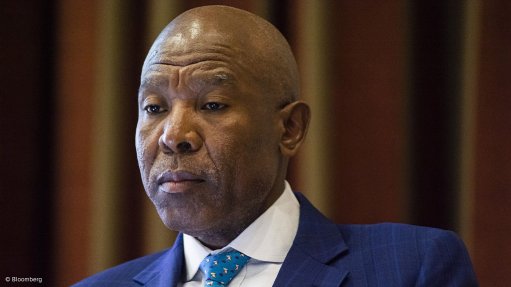
SARB governor Lesetja Kganyago
Photo by: Bloomberg
South Africa's central bank on Tuesday cut interest rates by 100 basis points for the second time in three weeks, taking its key repo rate down to 4.25 percent in the latest move aimed at mitigating the negative impact on the economy of the global Covid-19 pandemic.
After an emergency meeting of its monetary policy committee (MPC), the South African Reserve Bank (SARB) said it now expected the domestic economy to shrink by 6.1 percent in 2020, worse than the 0.2 percent contraction forecast just three weeks ago.
The SARB traditionally holds its meetings once every two months, but Tuesday's one was brought forward from May, after the previous meeting in March.
It said the impact of a nationwide lockdown imposed from March 27 to try and curb the spread of the coronavirus, which was initially set to last 21 days but has been extended by two weeks to the end of April, would be particularly severe for small businesses and individuals with earnings in the informal sector.
"Both the supply and demand effects of this extension reduce growth and deepen it in the short-term, as businesses stay shut for longer and households with income spend less," SARB Governor Lesetja Kganyago told a news conference conducted virtually in line with the lockdown rules.
"Monetary policy can ease financial conditions and improve the resilience of households and firms to the economic implications of Covid-19."
He noted that in addition to the continued easing of interest rates, the central bank had also taken steps to ensure adequate liquidity in money and government bond markets and to ease capital requirements to free capital for on-lending by financial institutions.
Each of these steps made more capital available to households and firms, said Kganyago, cautioning however that monetary policy could not on its own improve the potential growth rate of the economy or reduce fiscal risks.
"These should be addressed by implementing prudent macroeconomic policies and structural reforms that lower costs generally, and increase investment opportunities, potential growth and job creation. Such steps will further reduce existing constraints on monetary policy and its transmission to lending," he said.
Tuesday's cut in the repo rate, at which the SARB lends to commercial banks, means that the banks will, in turn, cut their lending rates to consumers by one percentage point to 7.75 percent.
Kganyago said the implied path of policy rates over the forecast period generated by the SARB's quarterly projection model indicated five repo rate cuts of 25 basis points extending into the first quarter of 2021.
But economist Iraj Abedian suggested the decreases applied so far might not be aggressive enough to ease pressure on the economy.
"It is better late than never that the SARB has cut the rate by another 100 bps (basis points). Certainly a move in the right direction," he posted on his Twitter account.
"I submit they need to do even more. Their gradual response is not as effective as it would have been if they cut the rate by 250 bps or 300 bps a few weeks back."